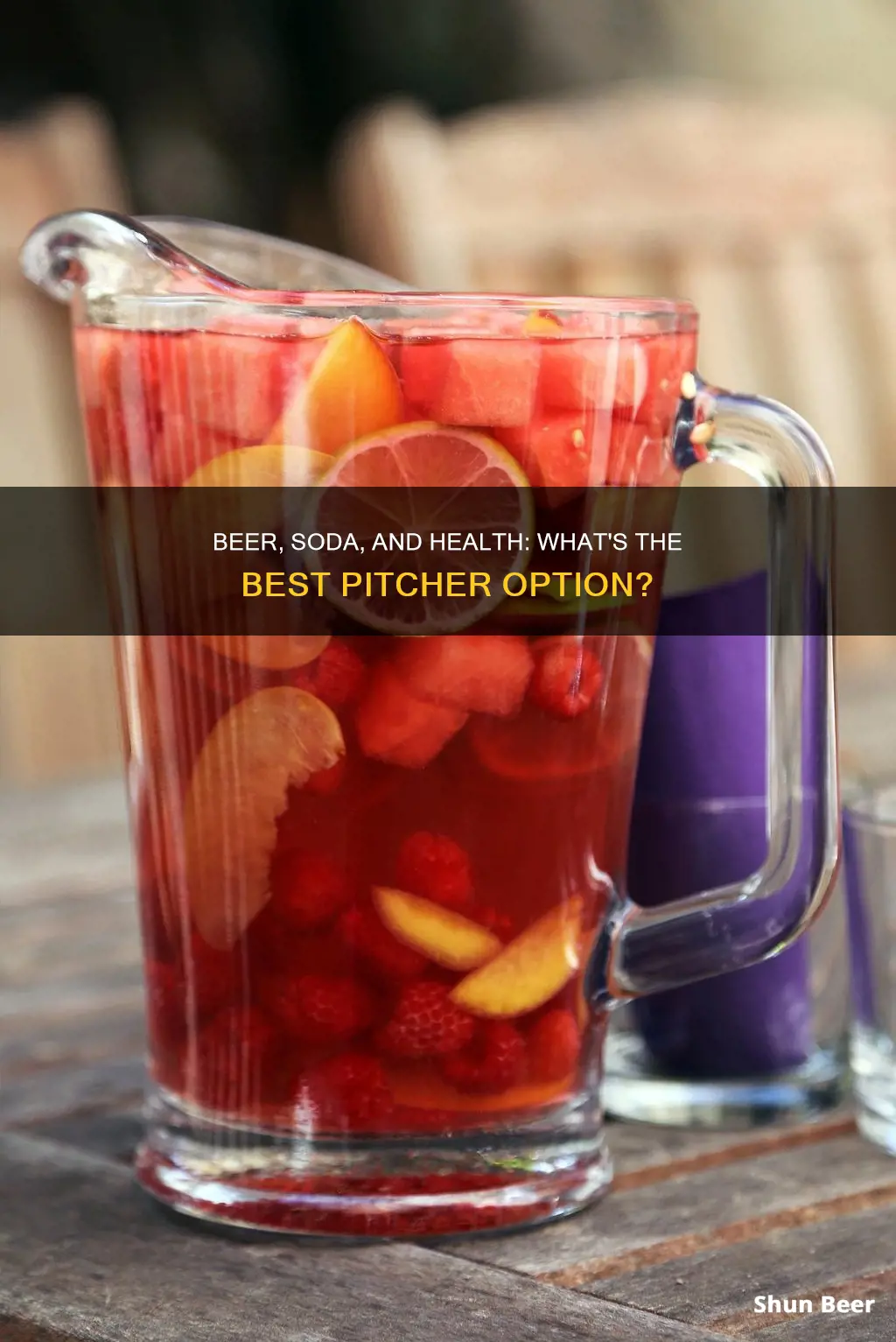
A pitcher of beer or soda is not considered a healthy drink. Both are indulgences that should be enjoyed in moderation as part of a well-balanced diet and exercise routine. While beer is often perceived as the less healthy option, when compared directly, it may be considered the healthier choice in some respects. A standard 12-ounce serving of beer contains around 1 to 2 grams of sugar, while a 12-ounce can of soda typically contains about 39 grams. Beer also tends to be lower in calories than soda, with light beers containing as few as 90 to 100 calories per 12-ounce serving. However, it's important to note that the health implications of alcohol consumption associated with beer should also be considered. Ultimately, neither beverage can be considered truly healthy, and excessive consumption of either can lead to adverse health effects.
| Characteristics | Values |
|---|---|
| Pitcher size | 32oz, 48oz, 60oz, 64oz, 72oz, 96oz |
| Number of servings | 6 servings of 10oz each or 5 servings of 12oz each |
| Calories | Beer: 100-150 calories per 12oz; Soda: 140-170 calories per 12oz |
| Sugar | Beer: 1-2 grams per 12oz; Soda: 39 grams per 12oz |
| Health effects | Beer: impaired judgment, liver disease, stroke, obesity; Soda: weight gain, diabetes, heart disease, liver disease, tooth decay, gout |
What You'll Learn

Soda has no health benefits, while beer has some vitamins and minerals
While neither beer nor soda can be considered "healthy" beverages, soda has no health benefits, whereas beer contains some vitamins and minerals.
Soda is a non-nutritious product that provides a lot of calories and virtually no nutrients. A 12-ounce can of standard soda contains about 39 grams of sugar, which is equal to about 9 teaspoons. This is significantly more than the recommended daily sugar intake for women (25 grams) and men (36 grams). Regularly consuming high levels of added sugar increases the risk of higher blood pressure, inflammation, weight gain, diabetes, and fatty liver disease.
In contrast, beer is considered a fairly nutritious beverage. It is an excellent source of vitamins and minerals, and some beers also contain antioxidants. The primary vitamins in beer are usually B-complex vitamins, including folic acid, niacin, riboflavin, and vitamin B-6. Consuming these vitamins is important as they are essential water-soluble nutrients that need to be consumed and replaced each day to stay healthy. Additionally, beer contains less sugar than soda, with only 1 to 2 grams of sugar in a 12-ounce serving.
Furthermore, several reviews have suggested that consuming one to two beers a day may help lower the risk of heart disease. Drinking light amounts of alcohol may also help reduce the risk of developing diabetes and improve blood sugar control for people with diabetes. Early research also suggests that moderate amounts of beer may help strengthen bones for men and postmenopausal women.
However, it is important to note that the health benefits of beer are dependent on moderate consumption. Heavy drinking eliminates most health benefits and can lead to addiction, reduced life expectancy, and an increased risk of liver disease. Additionally, drinking beer in excess can contribute to substantial weight gain, commonly known as a "beer belly."
Rum and Coke vs Beer: Which Drink is Healthier?
You may want to see also

Beer has fewer calories and less sugar than soda
While neither beer nor soda can be considered healthy, beer has fewer calories and less sugar than soda.
A 12-ounce can of standard soda contains about 39 grams of sugar, which is equal to about 9 teaspoons. In contrast, a standard 12-ounce serving of regular beer contains around 1 to 2 grams of sugar. The remaining sugar in beer contributes to its flavour and body.
When it comes to calories, soda provides anywhere from 140 to 170 calories, with no nutritional value. Beer is only slightly better, with a standard 12-ounce can containing approximately 100 to 150 calories. Light beers typically have lower alcohol content and fewer calories, ranging from 90 to 100 calories per 12-ounce serving.
The glycemic index (GI) measures how quickly a food or beverage causes a rise in blood sugar levels. The glycemic load (GL), which is more accurate and realistic, includes both the quality and quantity of carbs. Beer has a lower GL than soda, meaning the carbs in beer are less likely to raise your blood sugar levels.
Beer also has a nutritional advantage over soda. It provides vitamins such as thiamin, riboflavin, niacin, vitamin B-6, follate, and vitamin B-12, while soda has no vitamins at all. Additionally, beer has no fat and no sugar, whereas soda contains insane amounts of sugar that contribute to health issues like high blood pressure, diabetes, and severe tooth decay.
Sake vs Beer: Which Booze is Better for Your Health?
You may want to see also

Beer is less acidic than soda
When it comes to the healthiness of beer versus soda, one of the factors to consider is their acidity. Beer is less acidic than soda. Soda is very acidic and can be harmful to your digestive system and teeth, even in small doses. The acidity of a drink is measured on a pH scale of 0 to 14, with 7 being neutral. Water, for example, has a pH of 7. The lower the pH level, the more acidic the drink is, and each decrease in pH is 10 times more acidic than the level before.
Soda generally has a pH of 3 or lower, which is extremely damaging to teeth over time. The acidity of soda, combined with its high sugar content, can cause tooth decay as bacteria in the mouth turn excess sugar into acid that wears down tooth enamel. The phosphoric and citric acids in soda also contribute to its erosive potential. A study found that prolonged exposure to soda can lead to significant enamel loss, with some sodas causing enamel weight loss of more than 5% in 48 hours.
Beer, on the other hand, typically has a pH balance of around 4 and lower, making it less acidic than soda. However, it's important to note that wine is more acidic than beer, with sweet wines being the most acidic type of wine. While beer is less acidic, it can still be damaging to tooth enamel when consumed in large quantities or over an extended period. Additionally, the effects of beer on teeth can be exacerbated when paired with other acidic drinks, such as soda or fruit juices.
To minimize the harmful effects of acidic drinks on your teeth, it is recommended to drink through a straw or to only consume these beverages with meals. Water is also an excellent alternative, as it has a neutral pH and will not cause damage to tooth enamel.
Beer Nuts: Healthy Snack or Unhealthy Indulgence?
You may want to see also

Beer and soda are equally addictive
While beer and soda are both considered unhealthy, and neither is recommended by nutritionists, they are equally addictive. Both drinks have been shown to cause a release of endorphins in the brain, and the more you drink, the more endorphins are released. This leads to a build-up of tolerance, and over time, you will need to drink more to get the same release of endorphins. This is true for both beer and soda.
The main difference between the two drinks, in terms of addiction, is that beer can cause inebriation, which can lead to impaired judgment and coordination. However, this does not make beer more or less addictive than soda. The addictive properties of both drinks are similar, and the release of endorphins can lead to cravings and dependence.
Soda is made with potentially habit-forming ingredients like caffeine and sugar, which can lead to cravings and make it difficult to quit or moderate intake. Similarly, beer contains alcohol, which is a psychoactive substance that can impair judgment and coordination. Both drinks can affect the release of dopamine in the brain, which is associated with addiction and the development of addictive behaviours.
In terms of health effects, both beer and soda have been linked to negative health outcomes. Excessive alcohol consumption can lead to addiction, liver disease, and other health problems, while soda has been linked to weight gain, type 2 diabetes, heart disease, and other issues. According to the Centers for Disease Control and Prevention, the frequent consumption of "sugar-sweetened beverages" is correlated with a long list of health concerns. These include "weight gain/obesity, type 2 diabetes, heart disease, kidney diseases, non-alcoholic liver disease, tooth decay and cavities, and gout, a type of arthritis."
While beer may have a slight edge over soda in terms of calorie count and sugar content, both drinks are ultimately unhealthy and can lead to adverse health conditions. Therefore, it is essential to consume both beer and soda in moderation as part of a well-balanced diet and exercise routine.
Nonalcoholic Beer: Healthy or Just Hype?
You may want to see also

Both drinks are associated with an increased risk of several diseases
While beer is considered to be the "healthier" option when compared to soda, both drinks are associated with an increased risk of several diseases.
Soda is linked to a long list of health concerns, including weight gain, obesity, type 2 diabetes, heart disease, kidney disease, non-alcoholic liver disease, tooth decay, cavities, and gout. The high sugar content in soda, averaging 39 grams of sugar per 12-ounce can, contributes to high blood pressure, diabetes, and severe tooth decay. Additionally, the phosphoric acid in soda may negatively impact bone health.
Beer, on the other hand, is associated with an increased risk of liver cancer, stroke, and obesity due to its alcoholic content. Excessive alcohol consumption can lead to addiction, liver disease, and other health problems. However, it's important to note that moderate alcohol consumption may have some potential health benefits, such as positive effects on cardiovascular health and a reduced risk of diabetes.
Both drinks can be dehydrating and are associated with obesity. They are also sources of empty calories, providing energy without contributing significant nutrients.
When comparing the two, it's important to consider the frequency of consumption. While both drinks can be enjoyed in moderation, excessive consumption of either can lead to adverse health conditions.
Beer and Health: Occasional Drinking and Its Benefits
You may want to see also
Frequently asked questions
Neither beer nor soda is considered a healthy drink. Both are indulgences recommended to be enjoyed in moderation.
Frequent consumption of sugar-sweetened beverages is linked to weight gain/obesity, type 2 diabetes, heart disease, kidney disease, non-alcoholic liver disease, tooth decay, and gout. Beer, being an alcoholic drink, also increases the risk of liver cancer and stroke.
A 12-ounce can of standard soda contains about 39 grams of sugar, exceeding recommended daily limits. A standard 12-ounce beer typically has 1 to 2 grams of sugar.
A standard 12-ounce can of beer contains approximately 100 to 150 calories, while a 12-ounce can of soda has 140 to 170 calories. Light beers and diet sodas have fewer calories.
In 2010, the American Heart Association stated that there are benefits to drinking one 12-ounce beer each night. However, this does not apply to soda.







